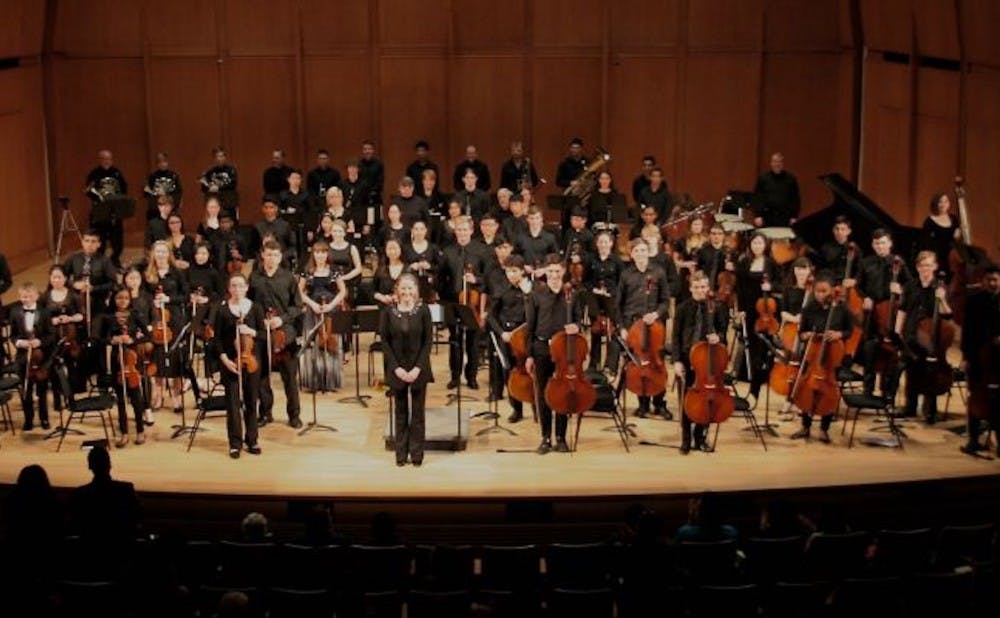As you walk up the steps toward the entrance of the Mary Duke Biddle Music Building, you pass a black, metal sculpture with geometric shapes stacked precariously on top of each other. Through the glass doors, you take the stairs down to the lower level and you are met with the sound of running water from a small, pebble-filled fountain. You catch the muffled music of violins and pianos as you walk down a long corridor. Finally, you arrive at the end of the hallway and enter office nine.
Every student taking lessons at the Duke University String School (DUSS) makes this same trip every Saturday. They come to Duke’s East Campus to take private or group classes in violin, viola, cello and bass. Aside from classes, the String School also offers chamber music, music theory and opportunities to participate in ensembles such as cello choirs and the Youth Symphony.
DUSS is unique in that it is the only string music education program in North Carolina that offers a comprehensive curriculum with everything from private lessons to master classes. Some parents, such as Carlos Bardales, drive their kids over an hour to Duke for classes. Having grown up in Honduras with a brother who played the cello, Bardales always wanted to the play the bass. But in music school, his teachers handed him a cello instead, saying his hands were too small.
Bardales moved to the states to continue studying cello, but didn’t expect his son’s desire to learn violin would land him a job as a cello teacher at DUSS. He now teaches and is also the Conductor of the Cello Choir at the school.
“It’s really exciting just being part of someone’s life and see that person flourish and loving what they do,” Bardales said.
After founding DUSS in 1967 with Arlene DiCecco, Dorothy Kitchen directed and developed the school for over 48 years. Just this year, DUSS celebrated its 50th anniversary under the new director Erica Shirts. The school began five decades ago with only 32 students and now it has over 250.
Duke University contributes the in-kind donation of space to the nonprofit organization. The school has access to an office in the Biddle Music Building as well as to the Nelson Music Room and Baldwin Auditorium for concerts and recitals. Remaining operation costs come from tuitions.
The school also offers financial aid to around 20 students who otherwise cannot afford to attend. Bardales says that those who receive aid are very grateful because sometimes that is the only chance they have to study music. He says they often excel.
“A school like this gives opportunity in the community for kids to come to get private lessons,” violin teacher Nonoko Okada said.
Although she has only been with the school for two years, Okada said she loves being involved and getting to enrich kids’ lives with music education.
“I think the best part is when my students realize how fun it is to play the violin and also realize that they got better and play well, just to see how happy they become,” Okada said.
Shirts shares similar sentiments and says that the best part of her job is “seeing kids light up” when they perform. As director of DUSS, she wants to make sure that there is a high quality of playing from day one. She says that a lot of parents think their five-year-olds can’t sound good on the violin from the start, but she wants DUSS to teach students so they sound good regardless of their level.
She also wants to build a closer relationship with the nonprofit Kidznotes, whose mission is music for social change and offers students in K-12 classrooms a chance to participate in group classes. Kidznotes funnels kids who need extra attention into DUSS, where they can get more individual instruction. In addition, DUSS will partner next year with the Ciompi Quartet to offer a program dedicated to advanced chamber music study.
“There’s always been a great community aspect to the string school,” Shirts said. “The kids grow up together and the families carpool to lessons.”
Bardales said that everyone plays their part to keep improving the school. The teachers consistently meet to discuss ways they can better the curriculum.
“This is a family because that’s the way we do it,” Bardales said.
The orchestras play music ranging from bluegrass to popular to classical. Although many students in the orchestras take lessons through DUSS, half take lessons with private professional musicians in the area. Anyone is eligible to participate at the orchestra level even if they don’t take classes with DUSS faculty.
Upcoming events include a Faculty Recital of Vivaldi’s Four Seasons Jan. 27 at 4 p.m. in the Nelson Music Room. There will also be a Violin and Cello Choir Concert March 3 at the Nelson Music Room and an Orchestra Concert March 4 at 6:30 p.m. in Baldwin Auditorium.
Get The Chronicle straight to your inbox
Sign up for our weekly newsletter. Cancel at any time.

